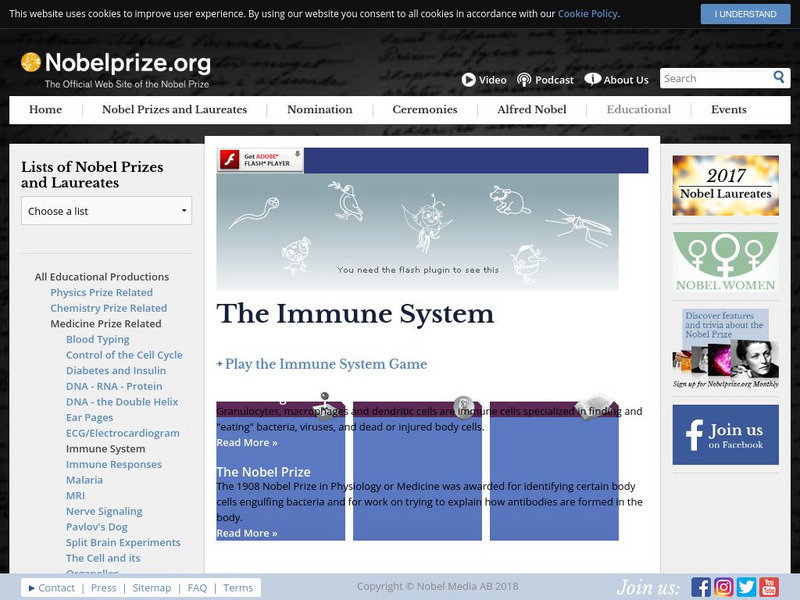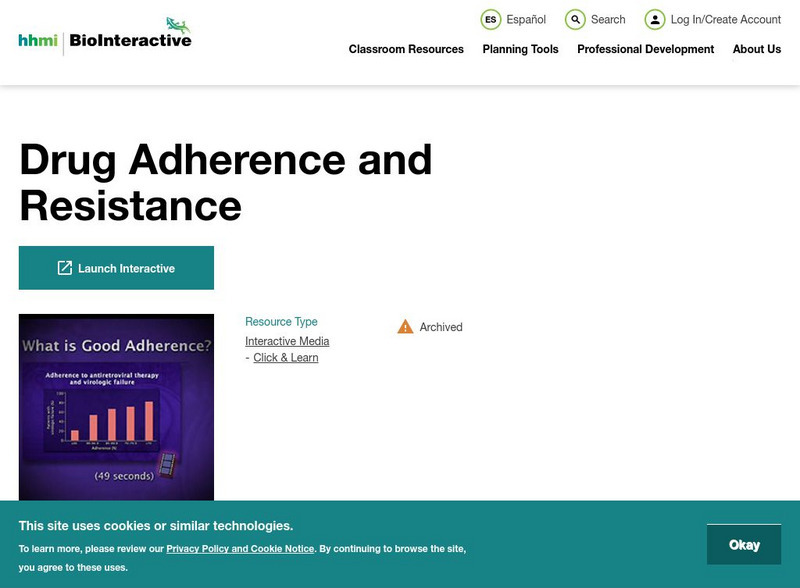Hi, what do you want to do?
Curated OER
Hazard Mitigation: Bioterrorism
High schoolers discuss different ways to spread infectious diseases. In this bioterrorism lesson, students model the rate of smoke emission using CalRoad software. They analyze the effects of airborne release of...
Curated OER
Student Investigation on the Immune System and Hemeagglutination
Students study laboratory protocol for hemagglutination experiments.
Curated OER
Opportunistic Diseases
Pupils explore the concept of opportunistic diseases. In this opportunistic diseases lesson plan, students take notes on a lecture regarding systemic herpes, candidiasis, cytomegalovirus, tuberculosis, MAC, recurrent pneumonia,...
Curated OER
When Germs Attack!
Students explore the hidden world of microbes and how our bodies spring into action in response to diseases. This ten lesson unit presents data on several microbial diseases and the reaction of the body's immune system.
Curated OER
Rodent-borne Diseases: Getting the Facts Out There
Students conduct research of the hantavirus pulmonary syndrome (HPS) or lymphocytic choriomeningitis (LCMV). They obtain the information and create a public announcement in the form of a brochure, newsletter, poster, radio announcement,...
Curated OER
What Do You Know About AIDS?
Students explore AIDS. In this AIDS lesson, students discuss their impressions and knowledge of the disease prior to listening to a lecture regarding the attributes of the disease.
Curated OER
Mutations--Preexisting or Acquired?
Students state the controls and variables of the Newcombe spread experiment. They state a hypothesis for the Newcombe spread experiment. Students distinguish between the characteristics of a preexisting mutations and those of an...
Curated OER
Mutations--Preexisting or Acquired?
Students explore the reasoning and experimental approaches to mutations. They expose a culture of E. coli to virulent bacteriophage and observe whether mutations of the cells existed previously or if the bacteria mutated as a response...
Curated OER
The Fight for Life
Learners explore the far-reaching impact of AIDS. In this World AIDS Day lesson, students research and compare AIDS statistics as well as advancements in treating AIDS. Learners create AIDS awareness posters.
Curated OER
Immunization
students study contents and origin of vaccines. They should understand the relationship of the vaccine to primary and secondary immune responses of the body. They work in pairs and share the responsibility of writing responses to...
Curated OER
Breaking News English: The Mystery of America's Vanishing Bees
In this English learning exercise, students read "The Mystery of America's Vanishing Bees," and then respond to 47 fill in the blank, 7 short answer, 20 matching, and 8 true or false questions about the selection.
Curated OER
HIV/AIDS, Year 2, Day 1
Students discover that HIV is a blood-borne virus which attacks to the body's immune system. They see the difference between being infected with HIV and being diagnosed with AIDS. They discuss which behaviors are safe and which are not.
Curated OER
Infection Control Word Search
In this word search worksheet, students search for terms related to infection control and community health. Words include infectious agents and other health terms.
Curated OER
HIV/AIDS & Other STDs, Day 3: HIV/AIDS
Students examine the characteristics of HIV and AIDS. They identify the liquids in which the disease is found and how it can be transmitted. They examine healthy behaviors to keep them from getting the disease.
Curated OER
Mixed Prepositions 20
In this online interactive English vocabulary skills worksheet, students respond to 13 multiple choice questions that require them to fill in the blanks in sentences with the appropriate prepositions.
Nobel Media AB
The Nobel Prize: The Immune System: Defending Our Bodies
Great game through which students learn about the immune system. Students read about cells that specialize in "finding and 'eating' bacteria, viruses, and dead or injured cells" and about the Nobel Prize in Physiology.
OpenStax
Open Stax: Anatomy & Physiology: The Immune Response Against Pathogens
Students learn about the development of immunological competence, and find out about the human body's immune response.
Khan Academy
Khan Academy: Two Flu Vaccines (Tiv and Laiv)
Understand the differences between TIV (dead virus) and LAIV (alive, but weakened virus) and the population that should get which one.
OpenStax
Open Stax: Anatomy and Physiology:diseases Depressed/overactive Immune Response
This section is about how the immune system goes wrong. When it goes haywire, and becomes too weak or too strong, it leads to a state of disease. The factors that maintain immunological homeostasis are complex and incompletely understood.
Howard Hughes Medical Institute
Hhmi: Bio Interactive: Drug Adherence and Resistance
This series of video lectures (in brief clips) and personal accounts stress the importance of drug adherence for patients on drug regimens for the treatment of HIV/AIDS.
PBS
Pbs Learning Media: Immune Cells in Action
In this video segment from The Secret of Life, watch as a virus attacks a cell, and learn how the immune system reacts to this onslaught. Includes background reading material and discussion questions. [1:40]
Khan Academy
Khan Academy: Animal & Human Viruses
Learn about viruses of humans and other animals, the Baltimore classification system, and the HIV life cycle.
CK-12 Foundation
Ck 12: Biology: Virus Characteristics
[Free Registration/Login may be required to access all resource tools.] Introduction to the characteristics of viruses.
University of Arizona
The Biology Project: Immunology: Hiv and Aids Tutorial
Read this illustrated tutorial about the relationship between the HIV virus and AIDS. Also contains treatment and diagnosis information.




























